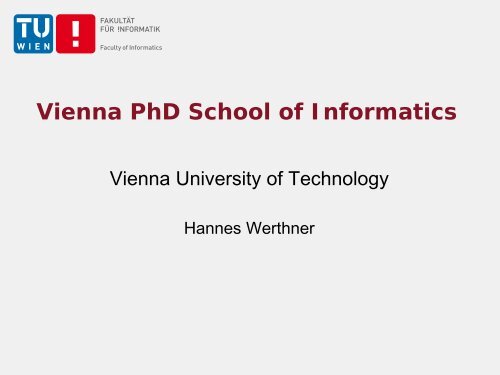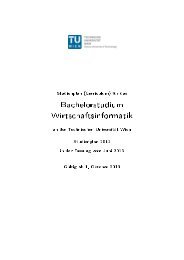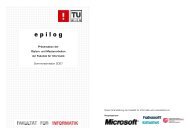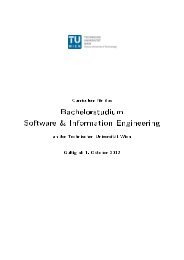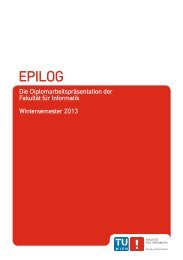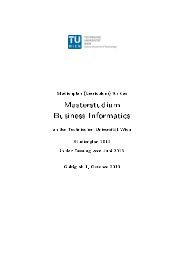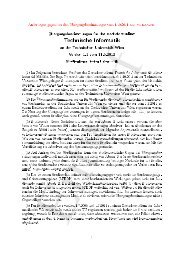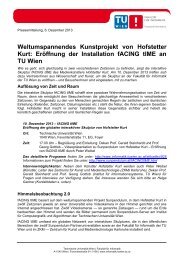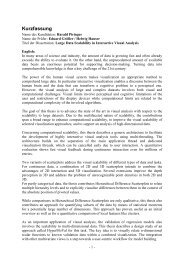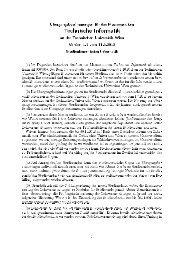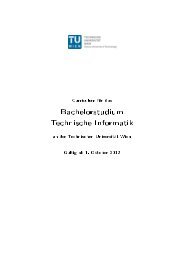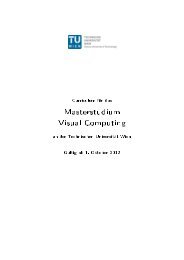Vienna PhD School of Informatics - Fakultät für Informatik, TU Wien
Vienna PhD School of Informatics - Fakultät für Informatik, TU Wien
Vienna PhD School of Informatics - Fakultät für Informatik, TU Wien
You also want an ePaper? Increase the reach of your titles
YUMPU automatically turns print PDFs into web optimized ePapers that Google loves.
<strong>Vienna</strong> <strong>PhD</strong> <strong>School</strong> <strong>of</strong> <strong>Informatics</strong><br />
<strong>Vienna</strong> University <strong>of</strong> Technology<br />
Hannes Werthner
Objectives<br />
• To increase quality and quantity <strong>of</strong> excellent young researchers<br />
• To position VUT in the international community at a high level<br />
• “Broad”: entire faculty <strong>of</strong> <strong>Informatics</strong>, not related to one single research<br />
topic<br />
• Also to extend international co-operations beyond concrete projects<br />
• The goal is to develop scientists, where each participant should<br />
• both have scholarship (breadth) as well as contribute to the development <strong>of</strong><br />
science (depth)<br />
• gain new scientific insights and present them comprehensively<br />
• gain the ability to solve complex scientific problems in both fundamental and<br />
applied research at a high international level<br />
• <strong>PhD</strong> students are qualified<br />
• to perform innovative research alone or in a team and<br />
• to assume (scientific) management and leadership positions
Further “Facts”<br />
• The curriculum covers computer science and business informatics<br />
• Three years full-time program with scholarship<br />
• All courses are in English<br />
• International co-operations with other Universities<br />
• Co-operations with industry<br />
• Funded by City <strong>of</strong> <strong>Vienna</strong>, Faculty <strong>of</strong> <strong>Informatics</strong><br />
• International participation: ~85 % come from abroad<br />
• Female participation: ~40%<br />
• Admission: based on a competitive examination <strong>of</strong> the applications<br />
(obtained degrees, master’s work done, letters <strong>of</strong> recommendation,<br />
interview)<br />
• This year 250 applications, 21 candidates selected (from Austria,<br />
Brazil, Kenya, Czech Republic, India, Pakistan, Poland, Russia,<br />
Serbia, Slovakia, Sweden, Indonesia, Iran, Pakistan, Ukraine, USA)
•<strong>PhD</strong> courses consist <strong>of</strong><br />
Curricula<br />
• Fundamental courses (15 credits, i.e., 5 courses): Philosophy<br />
<strong>of</strong> Science, Research Methodology, Research and Career<br />
Planning, <strong>PhD</strong> seminar /”conference”, Innovation<br />
• Area courses (24-27 credits, i.e., 8 area courses): 7 from the<br />
primary and 1 from another area (candidates choose)<br />
◦ Computational Intelligence<br />
◦ Distributed Systems<br />
◦ Media <strong>Informatics</strong> and Visual Computing<br />
◦ Computer Engineering<br />
◦ Business <strong>Informatics</strong><br />
• Two courses per area by visiting scientists<br />
• Students may also take “outside” courses (e.g., Summer<br />
schools or at other Universities)<br />
• Courses in the first two years – most in first year
Curricula<br />
Final Exam /<br />
<strong>PhD</strong> Defence<br />
Conference<br />
Papers<br />
<strong>PhD</strong> Thesis<br />
3 rd Year<br />
Qualifying<br />
Exam<br />
Comprehensive<br />
Exam<br />
<strong>PhD</strong> Courses<br />
Fundamental<br />
Courses<br />
5 courses<br />
Area Courses<br />
5 <strong>PhD</strong> courses<br />
3 Master courses<br />
1 st Year 2 nd Year<br />
Admission
• Area Courses<br />
Courses in Winter Term<br />
for 1 Year Students<br />
• Foundations <strong>of</strong> Business <strong>Informatics</strong> – Pr<strong>of</strong>. Kappel<br />
• Introduction to Media <strong>Informatics</strong> and Visual Computing – Pr<strong>of</strong>.<br />
Breiteneder<br />
• Advanced Topics in Service-oriented and Cloud Computing – Pr<strong>of</strong>.<br />
Dustdar<br />
• Primary Area Computer Engineering Introduction –<br />
Pr<strong>of</strong>s.Schmid/Steininger<br />
• Foundations <strong>of</strong> Data and Knowledge Systems – Pr<strong>of</strong>s.Eiter/Pichler<br />
• Area Specific Master Courses (to be determined by the<br />
student and his/her academic supervisor)<br />
• Other Area Courses<br />
• Model Checking – Pr<strong>of</strong>. Veith<br />
• Shape-from-function methods (Pr<strong>of</strong>s.Kropatsch/Landi)<br />
• Courses at IST Austria (Algorithms, Linear Algebra, Formal methods,<br />
Discrete Mathematics and Probability)
• Exams<br />
Exams and Organization<br />
• Comprehensive exam: evaluation <strong>of</strong> knowledge <strong>of</strong> the prerequisites – breadth and<br />
depth<br />
• Qualifying exam: essentially <strong>PhD</strong> proposal<br />
• Final exam (based also on external evaluation <strong>of</strong> <strong>PhD</strong> thesis)<br />
• Organization<br />
• Admission is based on a competitive examination <strong>of</strong> applications (written material<br />
and phone interviews)<br />
• The program is full-time<br />
• Students receive scholarships <strong>of</strong> 1.000 € / month to cover living costs (incl.<br />
insurance) + 1.000 € / year for travel to scientific events<br />
• Students integrated into research groups (assigned to an advisor), within the first<br />
year<br />
• Structure<br />
• Commission <strong>of</strong> the <strong>PhD</strong> school (representatives <strong>of</strong> research areas)<br />
• Director <strong>of</strong> the <strong>School</strong> – Pr<strong>of</strong>. Werthner<br />
• Assistants <strong>of</strong> the <strong>School</strong> – Clarissa Schmid, Maria del Carmen Calatrava Moreno<br />
• Pool <strong>of</strong> external scientists
Exams and Organization (2)<br />
• Schedule<br />
• Until February 2012: Students decide on their primary area<br />
• March 2012: comprehensive exam (2 papers selected from a list <strong>of</strong> papers –<br />
presentation and in-depth discussion)<br />
• Latest end <strong>of</strong> April 2012: Decision on advisor<br />
• September 2012: Qualifying exam (<strong>PhD</strong> Thesis proposal)
Administrative support<br />
• Clarissa Schmid<br />
• Financial support <strong>of</strong> students (paying scholarships rates, re-funding<br />
travel expenses).<br />
• Contact person for OeAD, Gemeinde <strong>Wien</strong> and <strong>of</strong>ficial Austrian<br />
institutions.<br />
• SAP system bookings (e.g. order entry for notebooks).<br />
• Mamen Calatrava<br />
• Academic support <strong>of</strong> students (answering questions regarding<br />
courses and exams).<br />
• Coordination <strong>of</strong> courses/lectures (schedules / meetings rooms,<br />
issuing <strong>of</strong> certificates).<br />
• Coordination <strong>of</strong> student meetings and exams.
Administrative Issues<br />
• Personal registration <strong>of</strong> all students at <strong>Vienna</strong> University <strong>of</strong><br />
Technology / Karlsplatz 13, „Studien- und Prüfungsabteilung“<br />
• Open bank account in Austria (inform C.Schmid about bank<br />
details, <strong>Vienna</strong> address and matriculation number)<br />
• Get <strong>TU</strong> account<br />
• Health insurance<br />
• Notebooks – status<br />
• <strong>PhD</strong> <strong>School</strong> students‘ room -> Paniglgasse 16, 4th floor<br />
• German courses


